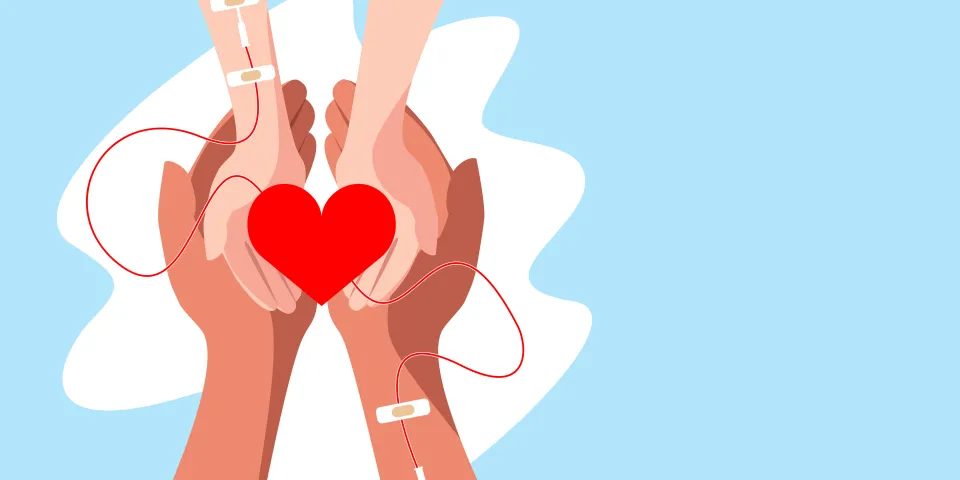Latest
Give the Gift of Life, Be A Blood Donor
Jan 3, 2023

You have the power to save lives—it is flowing through your veins. By donating your blood or plasma during January’s National Blood Donation Month, you can provide lifesaving assistance to those in critical need. The first successful transfer of human blood happened as far back as 1818 and by 1948, the Red Cross had begun its first nationwide blood program for U.S citizens at its original collection location in Rochester, New York.
As a result of this incredible innovation, 4.5 million American lives are saved each year through blood donations. Even seemingly small donations can go a long way, with a single donation having the potential to save up to three lives. Unfortunately, only 37% of Americans are eligible to give blood, and less than 10% of those who can donate do donate annually. That makes your decision to donate an even more important choice.
What to expect?
Donating blood for the first time can be intimidating. To better understand what your lifesaving efforts will look like, here is what you can expect during your first donation:
- Registration: Sign in, show an ID, and read some required information
- Health History and Quick Physical: Answer a few simple questions and receive a general health check
- Donation Time: You’ll be seated in a comfortable chair while blood is drawn, a process that only takes about 8-10 minutes
- Snacks and Recovery: Once the donation is complete, you will be provided with a snack and drink for a 10–15-minute period to ensure you’re good to go on with your day
And that’s it! It is that easy to help save a life. On average the whole process takes about one hour—a small investment of time for lifesaving results.
What’s it used for?
If it’s your first time donating blood, you could be wondering—what will this donation be used for? Once your donation clears testing, the blood will be transported to healthcare facilities, such as blood banks, hospitals and clinics. There, the blood will be available for patients in need of surgery, cancer treatments, and transfusions for blood loss due to injuries.
Knowing your blood type will help healthcare professionals create the most effective care plans for those that can benefit from your donation. Out of the eight possible blood groups, type O- blood is considered the most universal type since it can be used to help patients in emergencies where a patient's blood type is unknown. Because of this universal fit, it is the most in-demand donation.
If you don’t know your blood type, or how in demand it is, ask the healthcare professional assisting you when giving a blood sample or donating blood to check for the type.
How does your blood save lives?
While any safe donation of blood is beneficial and an act of selflessness, it does come down to saving lives. From accident victims and burn victims to heart surgery patients and cancer patients, someone needs blood every two seconds in America. Here are some examples of whom your donation will help:
- Cancer Patients: Ideal blood types are A+, A-, B+, O+, AB+ and AB-
- Trauma Patients: Ideal blood types are O+, O-, B-, A-, AB+ and AB-
- Sickle Cell Patients: Ideal blood types are O- and O+, specifically from patients of African descent
- Burn Patients: Ideal blood types are AB+, AB-
- Patients' Chronic Diseases: All blood types are needed
Regardless of your blood type or location, all eligible blood donations are crucial in keeping millions of Americans happy and healthy. Click here to check your eligibility status and locate a local blood donation center in your area to start saving lives.
Learn More About Our Career Programs
BLS pay estimates calculate the median annual wage for various occupations. Per the BLS the median wage for an occupation is: "The wage at which half of the workers in the occupation earned more than that amount, and half earned less. Median wage data are from the BLS Occupational Employment and Wage Statistics survey." Bureau of Labor Statistics (BLS), U.S. Department of Labor, Occupational Outlook Handbook 2024. BLS median wage estimates do not represent entry-level wages and/or salaries. Multiple factors, including prior experience, age, geographic market in which you want to work, and degree level and field, will affect career outcomes, including starting salary and earnings as an experienced employee. Herzing neither represents that its graduates will earn the median salaries calculated by BLS for a particular job nor guarantees that graduation from its program will result in a job, promotion, particular wage or salary, or other career growth.
Latest
Recent Blog Posts
Subscribe to our Newsletter
Get the latest news you need to know, from study hacks to interview tips to career advancement. Have it delivered right to your inbox biweekly.








